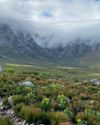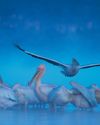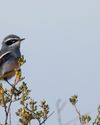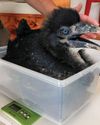
The Western Osprey Pandion haliaetus is a globally widespread species, resident in tropical climes but migratory in the higher latitudes. The migrant Palearctic population breeds in Europe, with the birds dispersing into Africa, predominantly West Africa and to a lesser extent South Africa. We see a reasonable number of them in our estuaries and open water bodies in summer and, for me, it is always special to see one.
We spend our summer holidays in St Francis Bay, a coastal town in the Eastern Cape province of South Africa, which hugs the southern bank of the Kromme River estuary. The mouth of the river spills into the Indian Ocean and is a perfect overwintering spot for Western Ospreys as the water is clear and the fish life prolific. I always have my camera with me on the boat just in case we get decent views of an osprey (or any other bird, for that matter), which is exactly what happened when we headed upriver on 13 December 2021.
Just as I got the boat onto the plane as we were motoring up the Kromme River, I noticed an osprey flapping languidly towards us in typical hunting mode, about 30 metres above the water surface with eyes directed downwards, looking for fish. I guessed that there might be a photo opportunity, so I slowed the boat and grabbed my camera as the bird came past us. As it did, I fired off a few shots and, in addition to a few side-on flight images, I captured it diving, talons down, and nabbing a flathead mullet before it flew off to feed.
This story is from the {{IssueName}} edition of {{MagazineName}}.
Start your 7-day Magzter GOLD free trial to access thousands of curated premium stories, and 9,000+ magazines and newspapers.
Already a subscriber ? Sign In
This story is from the {{IssueName}} edition of {{MagazineName}}.
Start your 7-day Magzter GOLD free trial to access thousands of curated premium stories, and 9,000+ magazines and newspapers.
Already a subscriber? Sign In

EXPLORING NEW HORIZONS
Keith Barnes, co-author of the new Field Guide to Birds of Greater Southern Africa, chats about the long-neglected birding regions just north of the Kunene and Zambezi, getting back to watching birds and the vulture that changed his life.

footloose IN FYNBOS
The Walker Bay Diversity Trail is a leisurely hike with a multitude of flowers, feathers and flavours along the way.

Living forwards
How photographing birds helps me face adversity

CAPE crusade
The Cape Bird Club/City of Cape Town Birding Big Year Challenge

water & WINGS
WATER IS LIFE. As wildlife photographer Greg du Toit knows better than most.

winter wanderer
as summer becomes a memory in the south, the skies are a little quieter as the migrants have returned to the warming north. But one bird endemic to the southern African region takes its own little winter journey.

when perfect isn't enough
Egg signatures and forgeries in the cuckoo-drongo arms race

Southern SIGHTINGS
The late summer period naturally started quietening down after the midsummer excitement, but there were still some classy rarities on offer for birders all over the subregion. As always, none of the records included here have been adjudicated by any of the subregion's Rarities Committees.

flood impact on wetland birds
One of the features of a warming planet is increasingly erratic rainfall; years of drought followed by devastating floods. Fortunately, many waterbirds are pre-adapted to cope with such extremes, especially in southern Africa where they have evolved to exploit episodic rainfall events in semi-arid and arid regions. But how do waterbirds respond to floods in areas where rainfall - and access to water - is more predictable? Peter Ryan explores the consequences of recent floods on the birds of the Western Cape's Olifants River valley.

a star is born
It’s every producer’s dream to plan a wildlife television series and pick the right characters before filming.